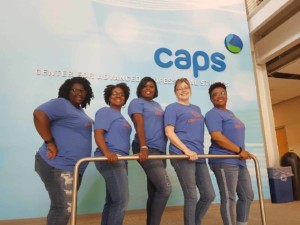Activating a Network: Relationships, Trust and Being Selfish

By Corey Mohn
A few months back I authored a blogpost on Getting Smart called The Power of a Network describing the birth of the Center for Advanced Professional Studies (CAPS) in the heartland and the U.S., a program putting high school students (and their passion and autonomy) first and making authentic professional projects for students the rule rather than the exception.
After launching with around 100 early-adopter students in 2009, the program continues to grow significantly in its footprint, now reaching nearly 1,000 students in the Blue Valley School District. Additionally, the program has become a “north star” for many others, spawning a power consortium called the CAPS Network. As of today, there are 31 program affiliates of the CAPS Network, including 60 school districts across 10 states. This year, the collective programs will reach nearly 10,000 students.
To understand the power of a learning network, we must dig deeper and focus on more than merely counting the number of participants. What separates a game-changing network from a glee club or promotional clique? The answer is in these three keys:
- The network must foster real relationship building at all levels (administrators, teachers and students);
- A high level of trust must be established and maintained between the network’s stakeholders; and
- Each member of the network must selfishly leverage the other members of the network.
Relationship Building
This one seems so simple, and yet so many take this for granted. Living in a technological world, there is a premium put on driving efficiencies and minimizing the expenditure of time and money. Call me old-fashioned, but when it comes to building relationships with people, nothing beats an in-person meeting.
We are awash with opportunities to connect via email, Skype and webinar every single day, and while these interactions can share content and guidance on tactics, they rarely build solid relationships with those who could become your co-conspirators in changing the look of your classroom or program. It turns out we still need authentic human interaction to accomplish that.
Within the CAPS Network, our schools come together for an annual conference called the CAPS Summer Huddle. The event is intentionally structured to connect teachers and administrators in settings that foster relationship building. This coming year, our school affiliates will continue their work by gathering in person at regional meetings. You must know and care for the people you work with in order to maximize the power of your network.
Trust
That leads me to trust. It is one thing to have a working relationship with a professional connection. It is another to create a colleague who becomes your partner in crime toward a common cause. In working with our CAPS affiliates, I often use the word friendship.
Think about who you trust most when the going gets tough – is it the person you met virtually and only see on your computer screen, or someone with whom you have shared cups of coffee, meals and experiences? If we want to truly maximize our potential and raise the bar to meet a massively-transformative purpose, we need people who are more like friends and less like avatars. Out of friendship comes trust.
Inside of the CAPS Network, we ensure there are regular in-person visits between members. That includes being willing to travel and visit your colleagues (friends!) at their schools. There is no better way to honor your colleagues and partners in crime than to take the time to pay them a visit and let them show off their great work. And guess what? It is the best way to discover “next practices” that you can leverage back at your own program.
Selfishly Leverage
Speaking of leverage, let’s talk about what it means to selfishly leverage. I’m guessing of the three keys to creating a game-changing network, this one had you scratching your head. We often think of networks as collegial and collaborative. Isn’t being selfish the opposite of being a good partner? The answer is NO! If you want to maximize the value of your learning network, you must have as many of your affiliates acting as selfishly as possible.
Let me explain this through an example. In our program in the Kansas City area, we had students in our Foundations of Medicine course who wanted to increase the number and variety of professional experiences to which they were exposed. As self-advocates, they set off to connect with students in other CAPS Network programs offering medicine courses. The students were on a selfish mission to improve their experience.
They learned that other programs had unique cultures and course structures, including a number of programs that had embedded experiences at local hospitals (something our program did not fully utilize). This knowledge led to enhancements to our curriculum and improvement of the student experience here in Kansas City. Quite simply, when partners in a network focus on extracting value from other partners, they are building relationships and accessing the “living bridges” constructed to unite us. Using another metaphor, the connective tissue gets stronger the more people flex it, and the best way to do that is to chase after something you need.
What will your three keys unlock?
Corey Mohn is the Executive Director of the Blue Valley Center for Advanced Professional Studies in Overland Park, Kansas. Follow them on Twitter at @coreymohn and @bvcaps
For more, see:
- The Power of a Network: Living Bridges Driving Purpose
- Getting Smart Podcast | Barry Schuler on the Power of Networks
- Network Effects in Education
Stay in-the-know with all things EdTech and innovations in learning by signing up to receive the weekly Smart Update.





0 Comments
Leave a Comment
Your email address will not be published. All fields are required.